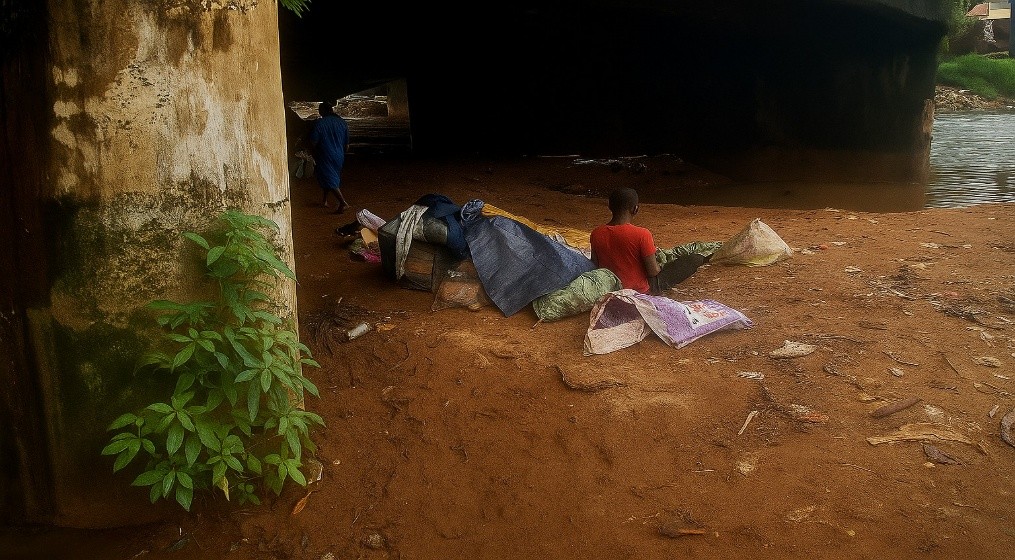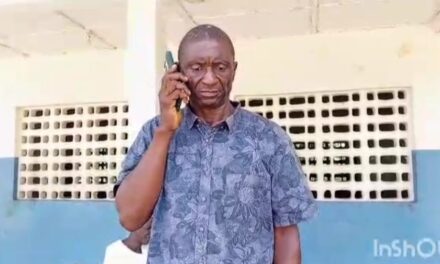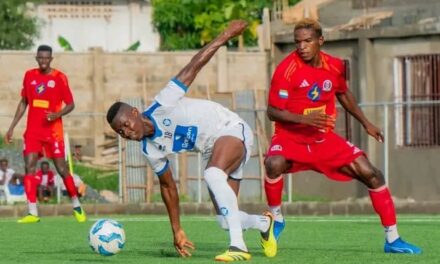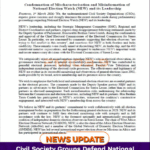By Kelfala Kargbo
Freetown, 25th August 2025 Beneath the Juba Bridge, where floodwaters creep and the cold bites deep, a quiet community of young men fights daily for survival. Their homes are makeshift, their beds damp, and their lives marked by loss and resilience.
“We are usually faced with cold that makes our entire body swollen. Many of my friends have died living under this bridge,” said Abubakarr Kamara.
Kamara has lived under the bridge since 2007. Despite the dangers, falling debris, disease, and the constant threat of flooding he calls it home. “This is my permanent residence,” he said, gesturing toward the four corners of the underside, his eyes looking around like a man surveying his kingdom.
Saidu Junior Kamara, known as “Chair” among the group, leads the camp of over seventy boys. He describes the rainy season as their worst enemy. “Sometimes we’re sleeping and water suddenly fills the entire place. We have to climb to the safer areas under the bridge,” he said.
But not everyone can climb. Swollen feet, open wounds and illness keep some grounded. Saidu pointed to a small shelter built from wood and covered with trampoline sheets. “I built this for those who can’t climb. It’s not much, but it’s something.”
The struggle beneath the bridge is not just physical, it’s social and psychological. Hassan Koroma, National Coordinator of Social Workers Sierra Leone (SWSL), has worked closely with the group. “Their health is compromised by poor hygiene and sanitation. Many turn to drugs just to cope,” he explained. “Socially, they are vulnerable to crime and exploitation. Survival often means making hard choices.”
Momoh Turay, another dweller, has lived under the bridge for a year. He describes the constant battle for safety. “When it rains, the whole place floods. We climb to the highest part and wait. One day you feel fine, the next you’re sick,” he said, clutching a wet blanket. “I’ve seen people die right here.”
Despite the hardship, support trickles in. “Every Sunday, we offer psychological support and provide food,” Koroma said. But he’s frustrated by the lack of coordinated effort. “The Freetown City Council is supposed to manage citizen welfare, but that’s not what’s happening.”
Residents near the Congo-Cross Bridge have also raised concerns. “These boys are part of our community, but they’re exposed to real dangers,” said Alfred Dumbuya. “As the rains intensify, their lives are at greater risk.”
Koroma is calling for inter-agency collaboration between the Youth Ministry, Social Welfare, Freetown City Council, and SWSL, to address the crisis. “We need to use funds wisely and stabilize the health and social conditions of these young men,” he urged.
Saidu recalled a visit from the Minister of Youth Affairs, who promised a structure to house them. “It was started, but never completed,” he said. “We need help. We’re tired.”
As August rains pound the city and the Sierra Leone Meteorological Agency issues warnings, the boys under the bridges brace themselves. For Abubakarr, Saidu, Momoh, and dozens more, the underside of the bridge is more than shelter; it’s the only home they know, even as it threatens their very lives.









